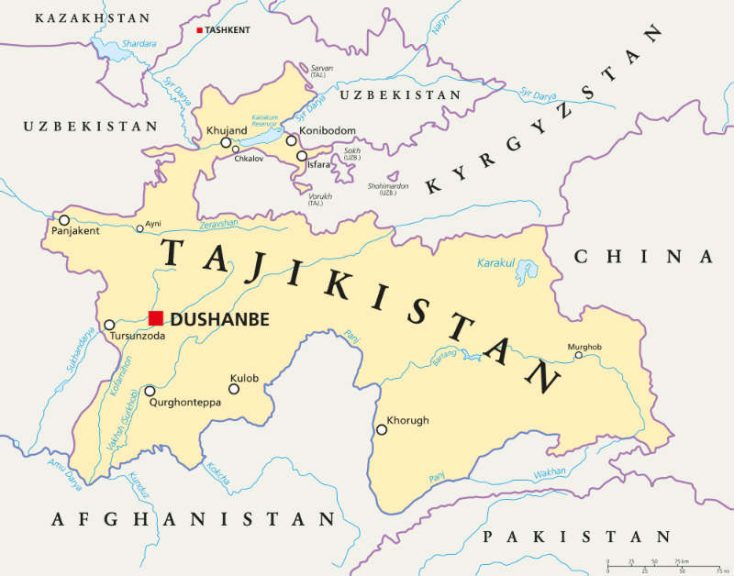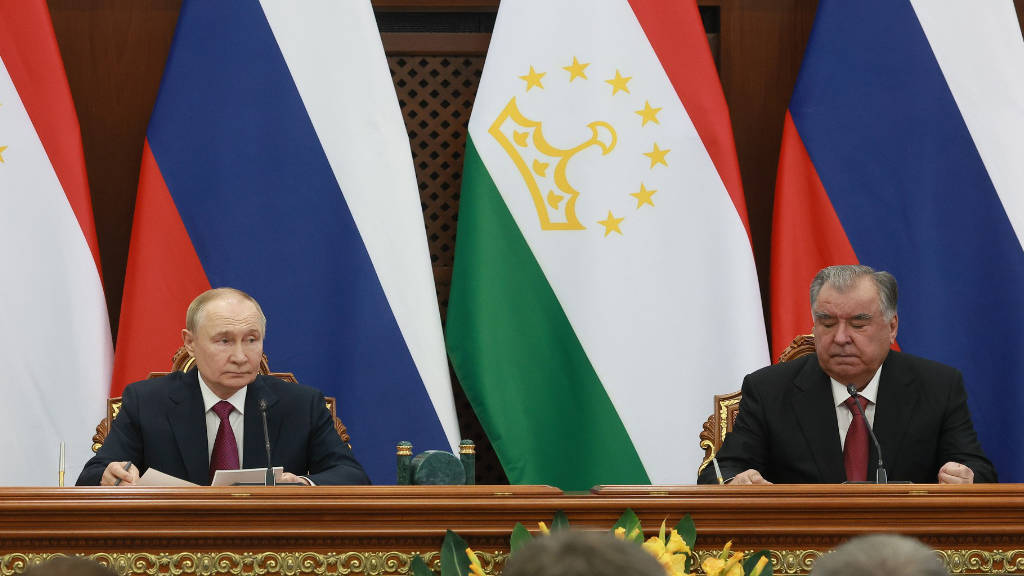The Russian President, Vladimir Putin, has been holding meetings with Emomali Rahmon, the President of Tajikistan, in Dushanbe. This is what they had to say:
Putin: “I would like to once again express my gratitude to President Rahmon for inviting me to make a state visit to Tajikistan, for the warm welcome extended to the Russian delegation, and for the friendly meeting I had with him yesterday evening. It was not just pleasant but also extremely useful for our business interaction.
Our talks were held in a business-like and constructive atmosphere, and that they were substantive and fruitful. This is fully in keeping with the friendly and allied nature of our relations. We had a detailed discussion on a broad range of issues related to our bilateral interaction in political, security, economic, trade, social, cultural and humanitarian cooperation. We exchanged views on a number of current matters on the international and regional agenda.
The joint statement we have adopted with the President of Tajikistan sets out new ambitious tasks aimed at further strengthening Russian-Tajikistani allied interaction. These efforts will be promoted by the interstate, intergovernmental and interdepartmental documents we have just signed.
I would like to note that Russia is one of the largest foreign trade partners for Tajikistan. Last year, our trade increased by over 7%, reaching US$1.5 billion, and it has continued to grow this year as well. I have already said, but I would like to repeat that it has already increased by 17.3% this year.
Russia is a leading investor in Tajikistan’s economy. Over 300 enterprises with Russian capital are working in the republic, and Russian investment has exceeded US$500 million.
Russia and Tajikistan have almost fully converted to the use of national currencies in their financial relations. The share of our currencies in commercial transactions exceeded 97% in 2024. We are developing reliable channels of lending and banking cooperation. Russian and Tajik citizens can make cross-border transfers via a fast payments system. Russian Mir payment cards are accepted in Tajikistan.
Our intergovernmental commission is actively working to implement economic cooperation programmes until 2027. A plan of joint actions to increase our trade by 150% by 2030 has been approved today as a follow-up to that programme.
Our country ships significant amounts of petroleum and refined products to the republic, almost fully meeting the energy needs of Tajikistan’s economy. Energy supplies are exempt from export customs duties.
Russia helps Tajikistan develop its hydropower industry. The Sangtuda Hydroelectric Power Plant built with Russia’s involvement, generates about 12% of the electricity consumed in Tajikistan. Russian companies are prepared to continue supporting the operation and modernisation of Tajikistan’s existing power generation facilities, offering cutting-edge technologies that meet the highest modern safety and environmental protection standards.
We also see potential for partnership in the peaceful use of nuclear energy. The state corporation Rosatom is open to cooperation and possesses unique expertise unmatched anywhere in the world, including in the construction of small modular reactors.
Russia and Tajikistan are implementing major joint projects in industrial cooperation. In particular, the two countries are jointly creating a full-cycle light industry cluster that includes cotton cultivation and the production of finished textile goods. Active work is underway to build a Russian-Tajikistani Industrial Park in Dushanbe.
Our country helps Tajikistan rehabilitate areas affected by mining and uranium extraction activities. A roadmap for joint action to reclaim the Digmai landfill was approved today.
Over 1 million Tajik citizens live and work in Russia. They are employed across a wide range of sectors, especially in fast-growing areas such as construction, housing and utilities, transport, and logistics, and make a weighty contribution to the Russian economy. Importantly, their remittances home serve as important support for their families and, more broadly, the Tajikistani economy. We strive to ensure decent working conditions and social protection for citizens of Tajikistan. The relevant Russian agencies maintain close contact with their Tajikistani counterparts on all important issues of migration policy.
Cooperation is making strides in the cultural and humanitarian spheres as well. The Russian language in Tajikistan enjoys the constitutional status as the language of interethnic communication. We are aware of the importance the President of the Republic attaches to this matter, and we express our sincere gratitude to him for doing this. We are successfully implementing a project of Russian-language school education. About 5,700 children are studying in accordance with Russian educational programmes at five schools in Dushanbe and several other cities.
Over 100 Russian teachers were sent to work in Tajikistan last year within the Russian Teacher Abroad project. About 35,000 young people are studying at Russian universities, their branches in Tajikistan and at the Russian-Tajikistani (Slavic) University. One of the largest quotas in the CIS – 1,000 government scholarships – has been approved for Tajikistan.
The construction of an international educational centre for gifted children and a new building of the Mayakovsky State Russian Drama Theatre is underway in Dushanbe with Russia’s support, also in accordance with the Tajik President’s initiative. We hope that these cultural facilities will open as early as in 2027.
Our discussions on current foreign policy issues have once again reaffirmed the shared positions of our countries. Russia and Tajikistan are committed to the principles of the primacy of international law, sovereignty and non-interference in each other’s internal affairs.
We closely coordinate our stances at the main international platforms, such as the UN, the CSTO and the SCO. This year, Tajikistan is successfully holding the chairmanship of the Commonwealth of Independent States, and we are providing all-round assistance to our Tajikistani friends. As you know, a summit of the Commonwealth of Independent States leaders will be also be held.
Russia traditionally makes a substantial contribution to peace and stability in the Central Asian region. At the same time, we are actively cooperating with our Tajikistani colleagues and strengthening our defence, military-technical, counterterrorism and drug enforcement ties. The 201st Russian Military Base located in Tajikistan is one of the guarantors of security in Tajikistan and the region as a whole.
In conclusion, I would like to emphasise once again that we remain committed to promoting our cooperation. We are also satisfied with the talks we have held today. I am confident that their outcome will facilitate the further strengthening of multifaceted Russia-Tajikistan relations for the benefit of our nations.”

Rahmon: “Once again, allow me to sincerely and wholeheartedly welcome you and the Russian Federation’s official delegation to Tajikistan.
Today, we held meaningful and constructive talks to discuss a wide range of bilateral and multilateral matters. We conducted this dialogue in an atmosphere of mutual trust, which demonstrates once again the high level of relations that Tajikistan and Russia have forged.
In this context, we spoke out in favour of continuing our political dialogue at various levels. We also noted the steadily increasing mutual trade, reaffirmed our mutual understanding and shared interest in stepping up our trade and economic ties, as well as diversifying our trade.
In addition, we discussed efforts to attract investment, establish joint ventures and carry out joint projects in priority sectors. This primarily includes various industrial sectors, including mining, textile, food and processing industries, as well as the non-ferrous metal industry. We also advocated for increased investment cooperation in energy, transport and agriculture.
At the same time, we attach special importance to promoting our cooperation in the digital economy and artificial intelligence.
We agreed to facilitate closer ties between our respective business communities and create a favourable investment climate for them.
In view of our recent agreements, we noted the need to carry out the agreement to create an industrial park in Tajikistan as quickly as possible and emphasised the importance of promoting region-to-region ties.
I must note that today, about 80 regions of the Russian Federation have agreements with regions in Tajikistan to promote trade, economic, cultural and humanitarian cooperation.
Regarding humanitarian affairs, we focused on science, education, culture and arts. We expressed our satisfaction with the decision of the Russian Government to offer a bigger scholarship quota to students from Tajikistan. We are grateful to the Russian Federation for supporting efforts to train Russian language teachers, publishing Russian language textbooks and study guides for Tajikistan’s schools, as well as for building five schools offering a Russian-language curriculum.
We are also grateful for Russia’s support in constructing the Centre for Gifted Children and the Vladimir Mayakovsky Russian Drama Theatre in Dushanbe. In this context, we emphasised the need for the continued training of theatre and film professionals at leading Russian educational institutions.
We reached an agreement to support academic exchanges, joint research initiatives, and forums for our creative and scientific communities.
We also emphasised the importance of further expanding ties in tourism and sport, recognising them as a key factor in bringing our peoples, especially the youth, closer together.
A particular focus of the talks was on regional and international security. We held a thorough discussion on the situation in the region, with special attention to challenges and threats such as terrorism, extremism, arms smuggling, and cybercrime. We underscored the importance of further coordinating our efforts to counter these threats effectively.
We highly valued the well-coordinated interaction between our respective law enforcement, intelligence agencies, and defence ministries.
We also emphasised the importance of strengthening cooperation in training professionals for our law enforcement, intelligence, military and military-technical agencies.
Furthermore, we exchanged views on enhancing collaboration within international and regional organisations, where our countries traditionally share similar approaches.
Following the talks, we signed a substantial package of bilateral documents covering important areas of cooperation. Of particular note are the agreements on labour migration, which strengthen the legal framework for deepening our cooperation in this area. In this context, it was noted that our migration cooperation is progressing constructively.
We reaffirmed our shared commitment to further deepening our strategic partnership across all areas and to the practical implementation of the agreements reached.
I am confident that the results of today’s talks will give a fresh impetus to the development of Tajikistani-Russian cooperation. They will provide additional momentum for the implementation of joint projects and open new horizons for our collaboration.”
Summary
Of particular note were the commitments to build an industrial park in Tajikistan, which will be useful for Russian and Tajik businesses to jointly work on products and added value for items destined for each other’s markets, as well as within the Commonwealth of Independent States as well as China.
The discussion of nuclear power also raises the possibility of small reactors being utilised in Tajikistan in the future, while Putin is known to be wanting to increase the volume of Russian investment into the country – both to keep Tajikistan onside and also as a gateway for some joint venture exports to China. Tajikistan signed an economic agreement with China last month, with Russian investors studying this to see what advantages there may be for their own involvement in Tajikistan.
Russia supplies large volumes of oil and oil products to Tajikistan, almost completely covering the needs of the Tajik economy for hydrocarbons. Gazprom Neft is actively operating on the Tajik market, owning a network of oil depots and petrol stations and providing a significant share of all tax payments to the state budget of the country.
Tajikistan has a population of about 10.59 million, a GDP (PPP) of US$59.42 billion, and a GDP (PPP) per capita of US$5,832. With a GDP growth forecast of 7% for 2025, the economic outlook remains positive.
Tajikistan’s trade with Russia has shown a steady increase, with bilateral trade turnover reaching US$1.5 billion in 2024. At current growth rates, it can be expected to hit about US$2.6 billion during 2025.
Further Reading

 Русский
Русский














